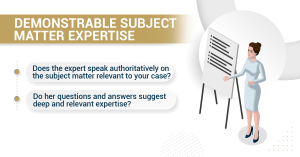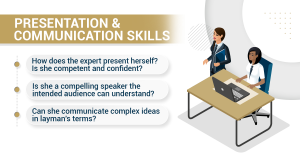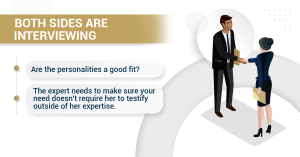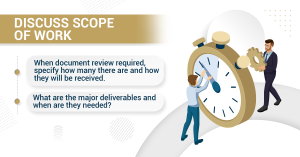Tips for a Great Expert Witness Interview
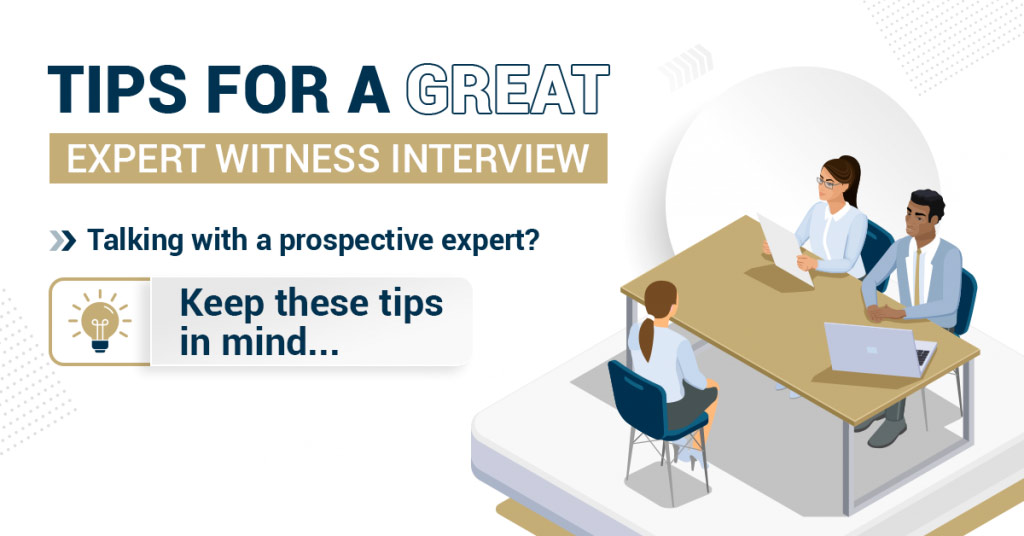
Over the last 27 years, we have coordinated and participated in tens of thousands of expert witness interviews. We’ve seen it all, from perfectly executed interviews to missed opportunities for critical lines of inquiry. Our experience highlights the importance of approaching expert interviews with the right mindset and preparation. It’s easy to get caught up in the details and strategy surrounding the case and miss the chance to gain a better understanding of the expert’s strengths and weaknesses.
The following are our four categories of takeaways from these experiences…
Evaluate the Expert’s Subject Matter Expertise
Expert witnesses serve to explain complex subject matter to counsel, judge and jury, so legal teams must gauge an expert’s knowledge and qualifications. Attorneys should begin this process during the initial interviews. Does the expert ask insightful questions, provide illuminating answers, and speak authoritatively on the important topics for the case?
Use some of the interview time to evaluate the expert’s credentials, certifications, and professional experience related to your specific matter. Pay close attention to how they respond to challenges and how confidently they convey ideas. The questions and answers provided during this time will go a long way in demonstrating deep and relevant expertise. An important consideration here is setting accurate expectations, so there are no surprises, and the expert has a north star for success.
The experts being interviewed are also aware of this intention behind the conversation. David Harkavy, a forensic accountant and economic damages expert says, “We go through interviews with prospective counsel, and we explain our work strategy or the way we perform our work so that they understand us. The last thing you want to do is to get into a situation where counsel has certain expectations that you cannot meet.”
Assess the Expert’s Presentation & Communication Skills
How an expert communicates an idea is nearly as important as the idea itself. Experts are responsible for communicating complex information and ideas in layman’s terms. Consequently, jurors appreciate experts who clearly explain themselves through simple terminology, metaphors, and engaging demonstrations and/or illustrations.
An expert’s experience and credentials are critical, but how they present themselves should not be overlooked. Jurors formulate opinions of the expert that reach beyond their knowledge, into areas such as appearance and communication style.
A professional appearance and demeanor impacts credibility. Clothing, grooming habits, posture, and eye contact can distract jurors from important issues. This ultimately comes down to likability. When a jury dislikes an expert, their testimony quickly can become counterproductive.
Interview questions illuminate other communication issues, such as experts taking over a conversation. Round Table Group Manager of Expert Witness Services David Sills explains, “The key is that it is a comfortable, back and forth conversation. Experts taking over a conversation is an issue. [However,] I do not want to create a situation where they do not share as much, because if that is their style, it is better if the attorney knows upfront.”
The most successful expert witnesses understand this and have true command of their written and spoken communication. While jurors may not understand an expert’s entire testimony due to the complexity of the subject matter, ability to passionately and confidently simplify an issue and demonstrate mastery, while emanating professionalism, can go a long way.
Remember: The Interview is from Both Sides
This interview goes both ways, as expert witnesses are also seeking confirmation that they will integrate well into your team. Litigators should always enter the interview with this perspective and assume they are also being vetted.
Round Table Group’s Senior Manager of Expert Witness Services, Monica Poole advises, “The expert has to remember they are interviewing the attorney as much as the attorney is interviewing them. The worst thing that can happen is they accept a case that is outside of their expertise, and they get excluded or they have a Daubert challenge against them. It marks their record and then from that point on they must always disclose it and discuss it on every interview after.”
The right fit encompasses not only subject matter expertise, but personality as well. Once retained, collaboration is a must, and personalities impact how effectively people work together. Legal teams understand hiring an expert with a poor subject matter or personality fit, or conflict can be damaging to a case. Experts recognize taking on a case beyond their expertise can lead to all manner of long-term career problems. Success as an expert witness requires everyone to fit the role, and savvy experts understand their effectiveness is impacted by the client who retains them, and how the entire team meshes.
Dr. Jolie Brams, an expert clinical and forensic psychologist explains, “That first phone call is key. In that phone call, I get a sense of what that attorney’s motivations are, what they would be like to work with, and whether we can work together. It is important to understand that their questions make sense. There are attorneys that call with questions that cannot mix in a legal sense. They want an answer which is not adherent to what psychologists can do for them. So yes, those initial conversations save a great deal of pain and a great deal of time.”
If There’s a Fit, Discuss What’s Required
An expert is only effective if they have the bandwidth to commit to the case, so a conversation around scope, timeline and deliverables is critical. If it seems like there’s a good fit, make sure to dedicate some interview time to exploring these expectations. Share details regarding document review so the expert can make an informed decision based on their availability. If you recognize the need for deep research early in the case, or expect a laborious report process, tell the expert now. The last thing a legal team wants is to miss court deadlines on expert deliverables because the expert’s availability was not confirmed prior to retention.
Insurance claims expert Kevin Quinley explains his perspective, “What deadlines exist for the report or disclosure, et cetera? Are they etched in stone? Are they negotiable with any wiggle room? How voluminous are the materials that need to be reviewed? Do not [give] generalities like “Oh not too much” or “Not too many.” Invariably there are. I learned the hard way by spending Christmas vacation going through multiple bankers’ boxes of documents at the beginning of my career as an expert witness on a short fuse case. You need to look at the deadline and the length of the runway that you have juxtaposed with the universe of documents.”
The key takeaway: expert witness interviews should allow legal teams not only to gauge expertise, but also personality and competency. Allow the expert to speak as much as possible so you can assess their capabilities and expose potential red flags, which can exist outside of their knowledge and credentials, and in personality and communication. An effective interview sheds light on all these issues and leaves both client and expert with a clear understanding of fitness for the role.
For more than 25 years, Round Table Group has helped litigators locate, evaluate, and employ the best and most qualified expert witnesses. Round Table Group is a great complement to any litigator’s quest for an expert witness and our search is always free of charge. Contact us at 202-908-4500 for more information or start your expert search now.


